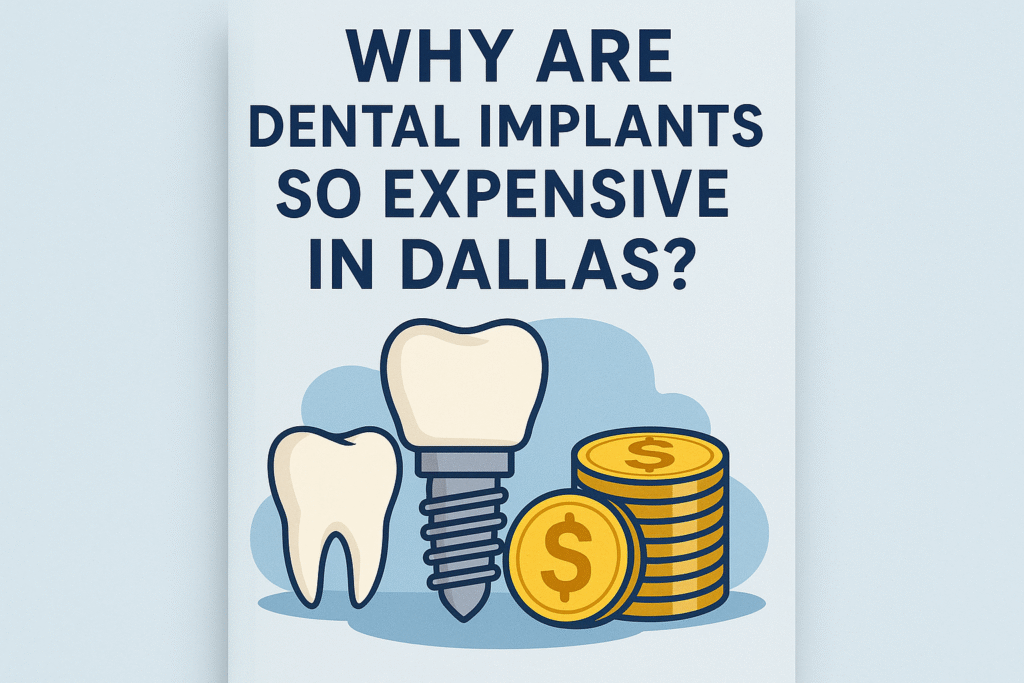When I first looked into getting dental implants in Dallas, I was shocked by the price tags I encountered. A single implant could cost anywhere from $3,000 to $6,000, and that was just the beginning. If you’re wondering why dental implants expensive Dallas procedures seem to cost so much more than other dental treatments, you’re not alone. The reality is that dental implant costs reflect a complex combination of factors unique to both the procedure itself and the Dallas market specifically.
Key Takeaways
- Dental implants in Dallas cost $3,000-$6,000 per tooth due to specialized materials, advanced technology, and skilled expertise required
- Multiple factors drive costs: titanium implant materials, surgical complexity, lab fees, and Dallas’s competitive healthcare market
- Insurance coverage is limited – Medicare typically doesn’t cover implants, but some dental insurance plans offer partial coverage
- Financing options exist including payment plans, dental loans, and HSA/FSA accounts to make treatment more affordable
- Long-term value justifies cost – implants last 25+ years compared to bridges (10-15 years) and dentures (5-10 years)
Understanding the True Cost of Dental Implants in Dallas
The question of why dental implants expensive Dallas procedures command such high prices requires understanding what goes into this complex treatment. Unlike a simple filling or crown, dental implants involve multiple phases, specialized materials, and highly trained professionals working together over several months.
The Multi-Phase Treatment Process
Dental implant treatment isn’t a single procedure – it’s a carefully orchestrated process that typically involves:
- Initial consultation and planning ($200-$500)
- Bone grafting (if needed: $300-$3,000)
- Implant placement surgery ($1,500-$3,000)
- Healing period (3-6 months)
- Abutment placement ($300-$700)
- Crown fabrication and placement ($1,000-$2,000)
Each phase requires specialized expertise, equipment, and materials, contributing to the overall cost structure that makes people ask why dental implants expensive Dallas treatments are priced as they are.
Breaking Down the Major Cost Factors
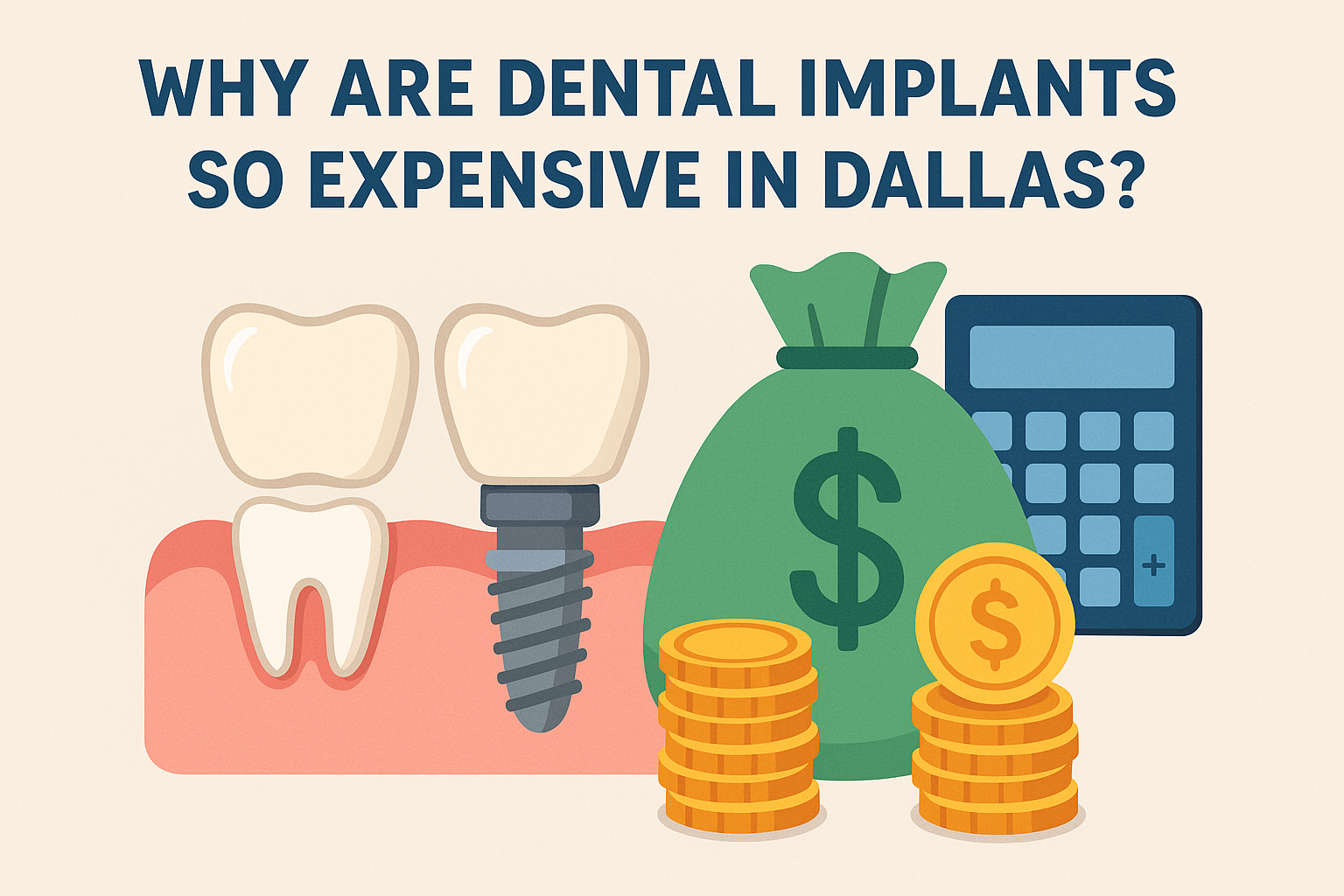
Premium Materials and Technology 🔬
Titanium Implants: The implant post itself is made from medical-grade titanium, a biocompatible metal that integrates with your jawbone. This isn’t cheap material – a single titanium implant can cost the dental practice $200-$400 wholesale.
Advanced Imaging: Modern implant placement requires 3D CBCT scans, digital impressions, and computer-guided surgery planning. These technologies improve success rates but add significant overhead costs.
Laboratory Fees: Custom crowns are fabricated in specialized dental laboratories using high-quality ceramics and precise manufacturing processes, typically costing $300-$800 per crown.
Specialized Expertise and Training
Dallas dental implant specialists invest heavily in their education and ongoing training. Board-certified oral surgeons and periodontists complete:
- 4 years of dental school ($200,000+ debt)
- 4-6 years of specialty residency
- Continuing education ($10,000+ annually)
- Facility overhead (rent, equipment, staff)
This expertise commands premium pricing, but it’s essential for successful outcomes.
Dallas Market-Specific Factors
The Dallas-Fort Worth metroplex presents unique cost drivers:
High Cost of Living: Dallas has above-average commercial real estate costs, affecting dental practice overhead.
Competitive Market: With numerous high-end practices, there’s pressure to invest in the latest technology and premium materials.
Affluent Demographics: Areas like Plano, Frisco, and Highland Park have higher average incomes, supporting premium pricing structures.
Insurance Coverage and Payment Options
Medicare and Dental Implants
If you’re wondering about Medicare coverage, the answer is typically no. Medicare considers dental implants cosmetic rather than medically necessary in most cases. However, there are rare exceptions when implants are needed due to:
- Facial trauma requiring reconstruction
- Cancer treatment complications
- Congenital defects
For detailed information about coverage options, you can explore our comprehensive cost comparison guide to understand your financial options.
Private Insurance Considerations
Most dental insurance plans offer limited implant coverage:
- Annual maximums: Typically $1,000-$2,000
- Waiting periods: Often 6-12 months for major procedures
- Coverage percentages: Usually 50% after deductibles
Financing Solutions 💳
Payment Plans: Many Dallas practices offer in-house financing with 0% interest for 6-24 months.
Third-Party Financing: Companies like CareCredit provide longer-term loans specifically for medical procedures.
HSA/FSA Accounts: These tax-advantaged accounts can cover implant costs, providing significant savings.
🦷 Dallas Dental Implant Cost Calculator
Your Estimated Costs
Total Cost: $0
After Insurance: $0
Monthly Payment (24 months): $0
Monthly Payment (60 months): $0
Comparing Dallas Prices to National Averages
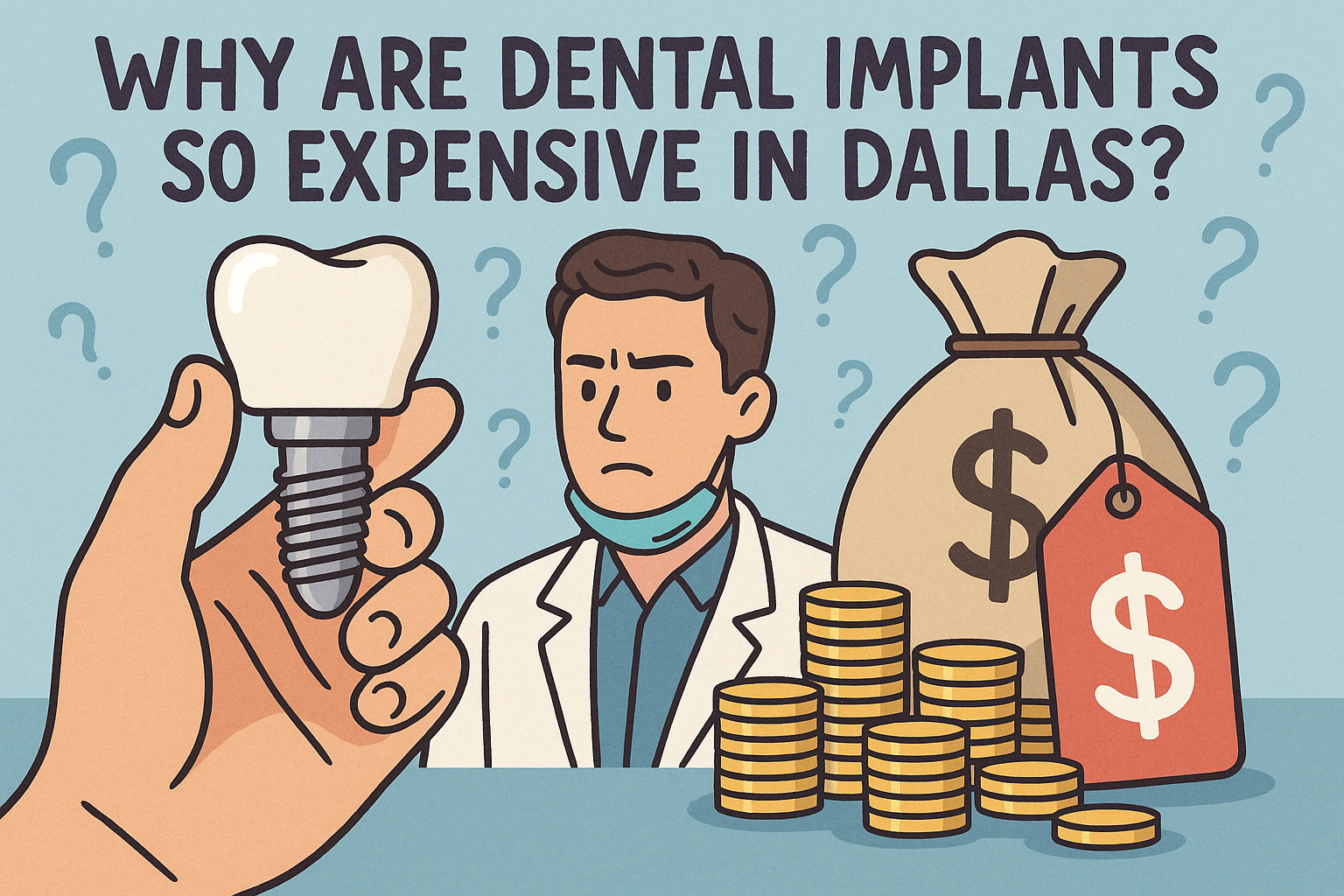
When examining why dental implants expensive Dallas procedures cost what they do, it’s helpful to compare local pricing to national trends:
National vs. Dallas Pricing
| Procedure Component | National Average | Dallas Average | Difference |
|---|---|---|---|
| Single Implant | $3,000-$4,500 | $3,500-$6,000 | +15-20% |
| Bone Grafting | $500-$2,000 | $800-$3,000 | +25-30% |
| Crown Placement | $1,000-$1,500 | $1,200-$2,000 | +20-25% |
Dallas prices tend to run 15-25% higher than national averages due to:
- Higher cost of living
- Premium practice locations
- Advanced technology adoption
- Competitive market dynamics
The Value Proposition: Why Quality Matters
Long-Term Cost Analysis 📊
While the initial investment is substantial, dental implants offer superior value over time:
Dental Implants (25+ year lifespan):
- Initial cost: $4,000-$6,000
- Annual cost: $160-$240
Dental Bridge (10-15 year lifespan):
- Initial cost: $3,000-$5,000
- Replacement cost: $3,000-$5,000
- Annual cost: $300-$500
Partial Denture (5-10 year lifespan):
- Initial cost: $1,500-$3,000
- Replacement frequency: Every 5-7 years
- Annual cost: $250-$400
Success Rates and Quality of Life
Modern dental implants have a 95-98% success rate when placed by qualified specialists. This high success rate, combined with their durability, makes them the most cost-effective long-term solution for missing teeth.
Ways to Reduce Dental Implant Costs in Dallas
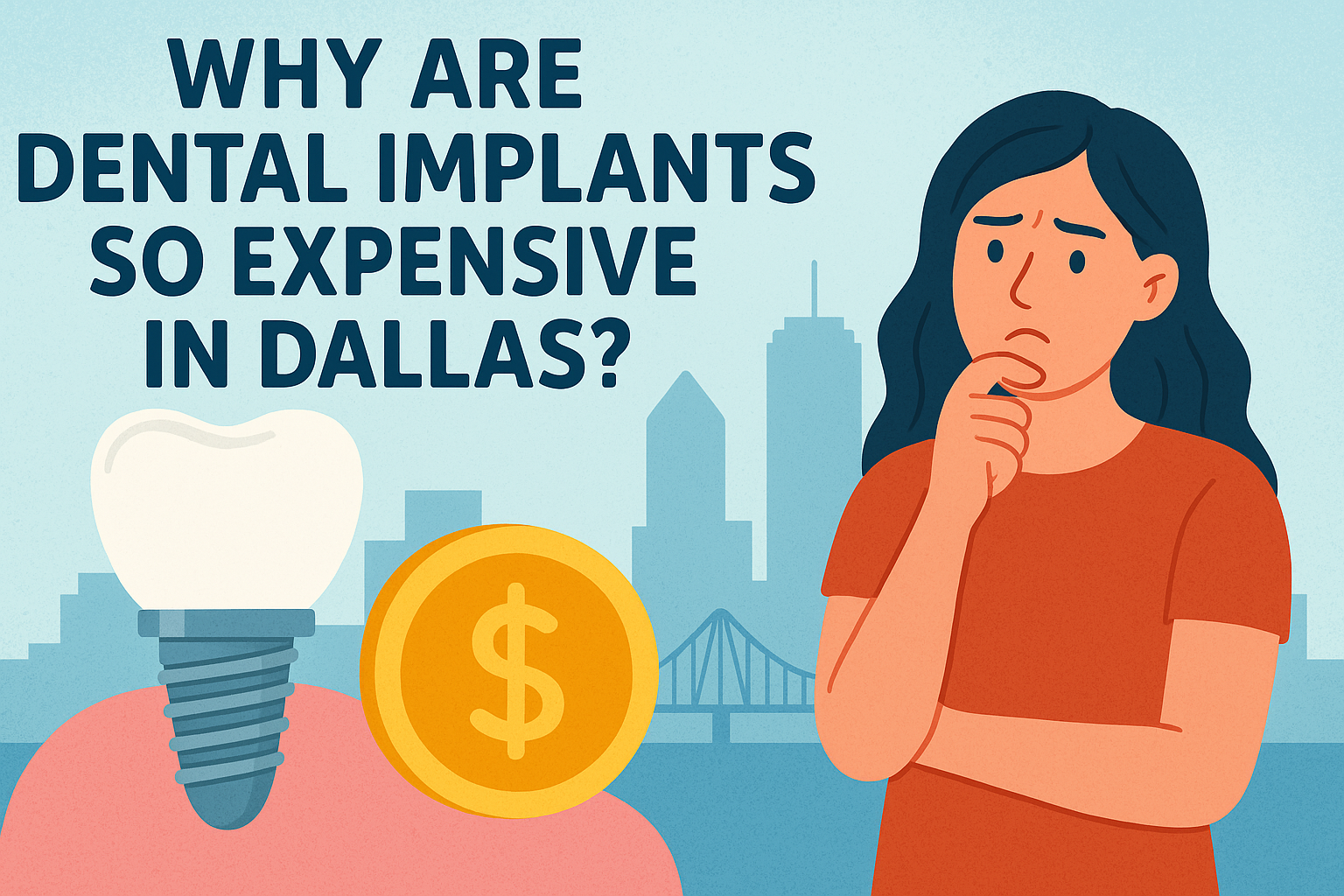
Timing Strategies ⏰
End-of-Year Planning: Many patients use remaining FSA/HSA funds in December, creating potential negotiation opportunities.
Seasonal Promotions: Some practices offer discounts during slower periods (typically January-March).
Practice Selection Considerations
Dental Schools: UT Health San Antonio and Texas A&M College of Dentistry offer supervised implant treatment at reduced costs.
Group Practices: Larger practices may offer economies of scale compared to boutique specialists.
Consultation Shopping: Many practices offer free consultations, allowing you to compare treatment plans and pricing.
For a comprehensive comparison of Dallas area providers and their pricing structures, visit our detailed service comparison page.
Geographic Arbitrage
Suburban Practices: Moving outside the Dallas city center can reduce costs by 10-20% while maintaining quality.
Medical Tourism: Some patients consider treatment in Mexico or other countries, though this carries additional risks and complications.
Insurance Navigation and Advocacy
Maximizing Your Benefits
Pre-Authorization: Always obtain written pre-authorization from your insurance company before beginning treatment.
Medical Necessity Documentation: Work with your doctor to document any medical (vs. cosmetic) reasons for implant treatment.
Appeal Processes: If initially denied, many successful appeals focus on functional necessity rather than aesthetics.
Alternative Coverage Sources
Employer Benefits: Some employers offer supplemental dental coverage or flexible spending arrangements.
Professional Associations: Certain professional organizations provide enhanced dental benefits to members.
State Programs: Texas has limited programs for low-income individuals requiring dental care.
Choosing the Right Provider in Dallas
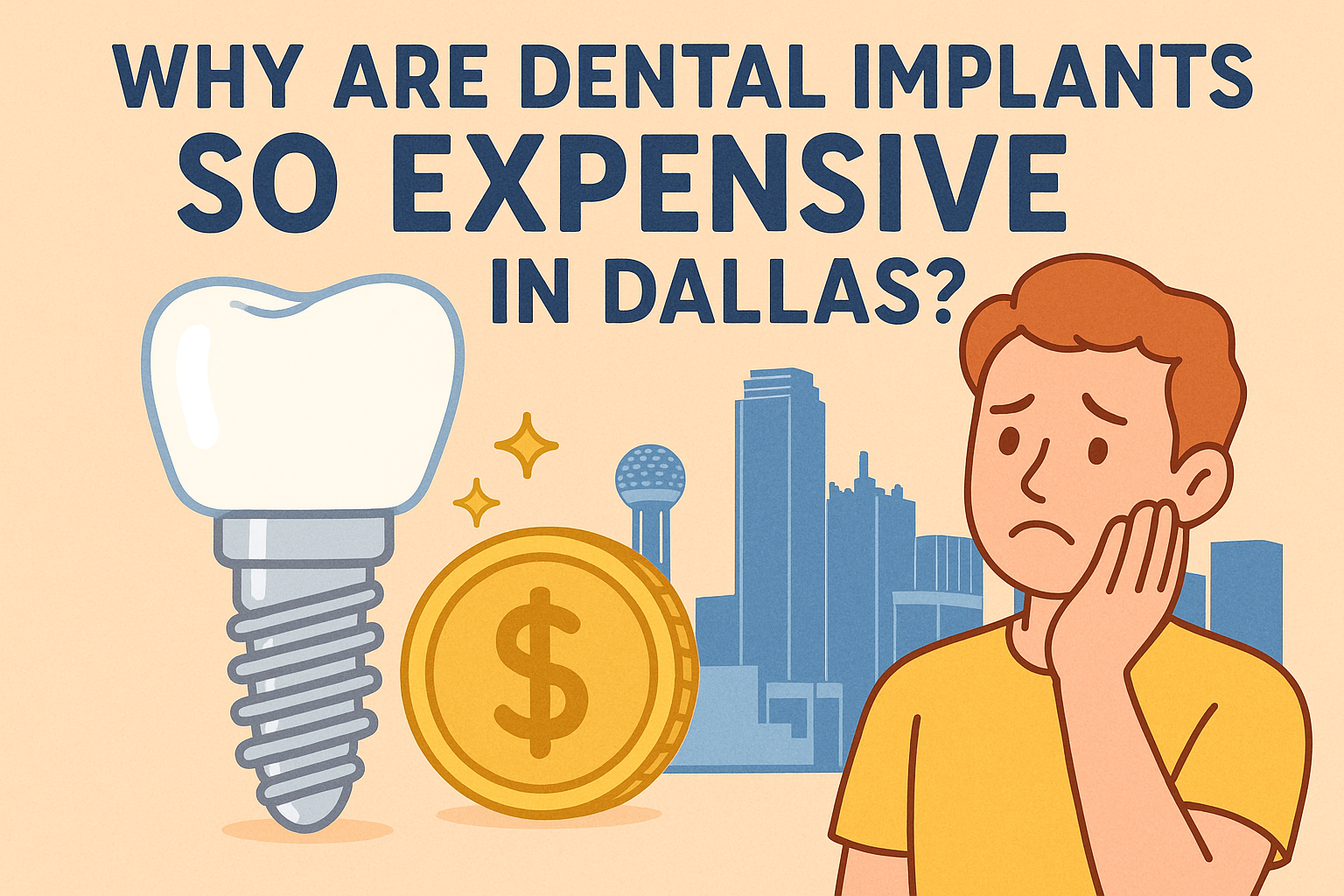
Essential Qualifications 🏆
When selecting a provider, verify:
Board Certification: Look for American Board of Oral and Maxillofacial Surgery or American Board of Periodontology certification.
Continuing Education: Providers should regularly attend implant-specific training and conferences.
Technology Investment: Modern practices should offer 3D imaging, guided surgery, and digital impressions.
Experience Volume: Ask about the number of implants placed annually (experienced providers typically place 100+ per year).
Red Flags to Avoid
- Significantly below-market pricing
- High-pressure sales tactics
- Lack of proper imaging or planning
- No clear treatment timeline
- Poor online reviews or credentials
You can learn more about selecting qualified providers through our comprehensive about us section which details the credentials to look for.
Future Trends Affecting Implant Costs
Technology Advancements
3D Printing: Custom abutments and surgical guides are becoming more affordable through improved manufacturing.
Same-Day Implants: Immediate loading protocols reduce treatment time and associated costs.
AI Planning: Computer-assisted treatment planning improves efficiency and reduces revision rates.
Market Competition
The Dallas market continues to see new providers entering, which may help moderate price increases over time. However, the high barrier to entry (equipment, training, facility costs) means dramatic price reductions are unlikely.
Insurance Evolution
Employer Pressure: As dental health’s connection to overall health becomes clearer, more employers may enhance dental benefits.
Medicare Advantage: Some Medicare Advantage plans are beginning to offer limited dental coverage, including implants in specific circumstances.
Making the Financial Decision
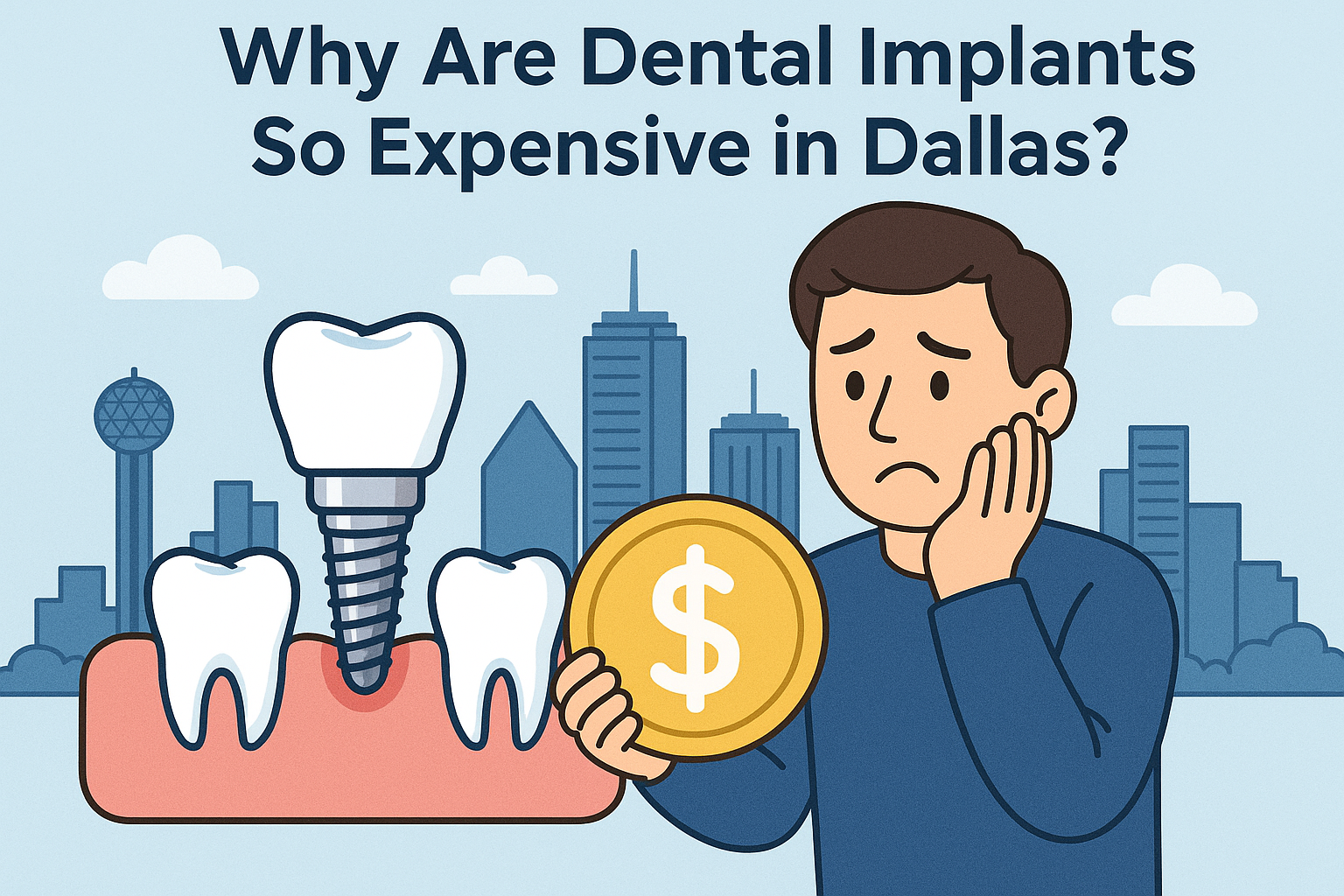
Cost-Benefit Analysis Framework
When evaluating whether to proceed with implant treatment, consider:
- Current oral health impact on quality of life
- Long-term costs of alternative treatments
- Available financing options and terms
- Insurance coverage potential
- Provider qualifications and success rates
Questions to Ask Your Provider
- What is included in the quoted price?
- What additional costs might arise?
- What is your success rate with similar cases?
- What warranty or guarantee do you provide?
- What financing options are available?
For specific questions about costs and financing, you can contact our team for personalized guidance.
Conclusion
Understanding why dental implants expensive Dallas procedures command premium pricing helps you make informed decisions about your oral health investment. The high costs reflect the sophisticated materials, advanced technology, specialized expertise, and Dallas market dynamics that ensure successful outcomes.
While the initial investment is substantial, dental implants offer superior long-term value compared to alternatives. The key is finding the right balance between cost and quality while maximizing available financing and insurance benefits.
Your next steps should include:
- Schedule consultations with 2-3 qualified providers to compare treatment plans and pricing
- Review your insurance benefits and explore all coverage options
- Consider financing alternatives including HSA/FSA accounts and payment plans
- Evaluate the total cost of ownership compared to alternative treatments
- Make your decision based on long-term value rather than just initial cost
Remember, choosing dental implants is an investment in your health, confidence, and quality of life. While the costs are significant, the benefits typically justify the expense when you work with qualified providers and plan your financing carefully.
For more detailed cost comparisons and provider information, visit our main resource page to continue your research and planning process.

